Authors Note:
This article will explore the profound influence the book of Deuteronomy and the story of Abraham & Isaac in Genesis 22 had on the numerical and literary framework of Daniel 9. May you be blessed (barak) by these words (dabar).
A Book of Words
In most English versions of the Bible, the 5th book is titled Deuteronomy. The etymology of this word comes from the Greek deuteros and nomos – literally meaning the Second Law. In Hebrew, the 5th book of the Bible is titled, Devarim (דברים) and comes from the Hebrew devar (dabar) and means “Words” or “The Words”.
Deuteronomy opens on the 1st day of the 11th month, of the 40th year of Israel’s wandering. Israel is camped in the wilderness on the other side of the Jordan river in preparation for entering the Promised Land. Here at the end of the 40 years in the wilderness, with the Promised Land in sight, Moses for the last time, speaks to the children of Israel.
Deuteronomy 1:3
And it came to pass in the fortieth year, in the eleventh month, on the first day of the month, that Moses spake (דבר dabar) unto the children of Israel, according unto all that YHWH had given him in commandment unto them;
An Oath of Sevens
In verse 8, just five verses after Moses begins to speak the “words” (dabar) of Yahweh to Israel, he provides them with the legal basis for their claim to the Promised Land. This legal claim, according to the text, originates when Yahweh sware (an oath) with Abraham which was confirmed with Isaac and Jacob.
Deuteronomy 1:8
8 Behold, I have set the land before you: go in and possess the land which YHWH sware [נשבע=shaba] unto your fathers, Abraham, Isaac, and Jacob, to give unto them and to their seed after them.
In Hebrew, the word shaba (sware) implies the making of an oath (shabuw’ah). As we’ll see in the text below, this oath originated in Genesis 22 when Abraham showed exceptional faith by his willingness to sacrifice his son Isaac as Yahweh instructed.
That act, taken in faith, believing that whatever the outcome, he and Isaac would return down off that mountain, was the catalyst for Yahweh’s unilateral declaration – His “shaba” with Abraham. This swearing (shaba) of an oath (shabuw’ah) in Genesis 22 was the first oath Yahweh sware with any man in the Bible. Take special note of Genesis 26:2-4 below, as it confirms that this shaba (swearing) with Abraham was in fact a shabuw’ah (oath).
Genesis 22:12-18
12 And he said, Lay not thine hand upon the lad, neither do thou any thing unto him: for now I know that thou fearest God, seeing thou hast not withheld thy son, thine only son from me. 13 And Abraham lifted up his eyes, and looked, and behold behind him a ram caught in a thicket by his horns: and Abraham went and took the ram, and offered him up for a burnt offering in the stead of his son. 14 And Abraham called the name of that place Jehovahjireh: as it is said to this day, In the mount of YHWH it shall be seen.
15 And the angel of YHWH called unto Abraham out of heaven the second time, 16 And said, By myself have I sworn [shaba’], saith YHWH, for because thou hast done this thing, and hast not withheld thy son, thine only son: 17 That in blessing I will bless thee, and in multiplying I will multiply thy seed as the stars of the heaven, and as the sand which is upon the sea shore; and thy seed shall possess the gate of his enemies;
18And in thy seed shall all the nations of the earth be blessed; because thou hast obeyed my voice.
Genesis 26:2-4
2 And YHWH appeared unto him [Isaac], and said, Go not down into Egypt; dwell in the land which I shall tell thee of: 3 Sojourn in this land, and I will be with thee, and will bless thee; for unto thee, and unto thy seed, I will give all these countries, and I will perform the oath [shabuw’ah] which I sware [shaba] unto Abraham thy father;
4 And I will make thy seed to multiply as the stars of heaven, and will give unto thy seed all these countries; and in thy seed shall all the nations of the earth be blessed;
Daniel 9 and Yahweh’s Oath with Abraham
This first oath in the Bible sworn unilaterally by Yahweh with Abraham was so important that not only did Moses use it in the opening verses of Deuteronomy as the legal basis for Israel’s claims to the Promised Land, but the prophet Daniel referenced it in his own opening words in the 9th chapter of the book that bears his name. In Daniel chapter 9 verse 4, Daniel opens his “prayers and supplications” to Yahweh by quoting Moses in Deuteronomy 7. This passage referenecs the “covenant and mercy to them that love him, and to them that keep his commandments”.
Daniel 9:4
4 And I prayed unto YHWH my God, and made my confession, and said, O Lord, the great and dreadful God, keeping the covenant and mercy to them that love him, and to them that keep his commandments;
A careful examination of Deuteronomy 7:7-9 & 12 makes it clear that this “covenant and mercy” was the the “shaba” YHWH made with “the fathers”. These “fathers”, Moses goes on to clarify in Deu. 9:5, originated with Abraham. For further confirmation from the book of Deuteronomy see the following references: Deu. 1:8; 6:10; 9:5; 30:20; 34:4.
Deuteronomy 7:7-9, 12
7 YHWH did not set his love upon you, nor choose you, because ye were more in number than any people; for ye were the fewest of all people:
8 But because YHWH loved you, and because he would keep the oath [shabuw’ah] which he had sworn [shaba] unto your fathers, hath YHWH brought you out with a mighty hand, and redeemed you out of the house of bondmen, from the hand of Pharaoh king of Egypt…
9 Know therefore that YHWH thy God, he is God, the faithful God, which keepeth covenant and mercy with them that love him and keep his commandments to a thousand generations;…
12 Wherefore it shall come to pass, if ye hearken to these judgments, and keep, and do them, that YHWH thy God shall keep unto thee the covenant and the mercy which he sware [shaba] unto thy fathers:
Genesis 26:2-4
2 And YHWH appeared unto him [Isaac], and said, Go not down into Egypt; dwell in the land which I shall tell thee of: 3 Sojourn in this land, and I will be with thee, and will bless thee; for unto thee, and unto thy seed, I will give all these countries,
and I will perform the oath [shabuw’ah] which I sware [shaba] unto Abraham thy father;
4 And I will make thy seed to multiply as the stars of heaven, and will give unto thy seed all these countries; and in thy seed shall all the nations of the earth be blessed;
Deuteronomy 9:5
5 Not for thy righteousness, or for the uprightness of thine heart, dost thou go to possess their land: but for the wickedness of these nations YHWH thy God doth drive them out from before thee, and that he may perform the word [dabar] which YHWH sware [shaba] unto thy fathers, Abraham, Isaac, and Jacob.
As you can see from the passages above, Daniel’s plea to Yahweh for His “covenant and mercy” was a call to remember the oath that Yahweh sware (shaba) with Abraham!
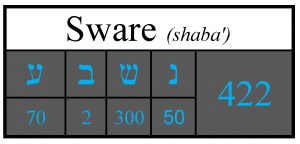 Numerical Considerations
Numerical Considerations
The numerical peculiarities of this form of the word sware (shaba – (נשבע) as found in Deu. 1:8 and 7:8, 12 are worth noting. This word shaba, in context, originates from the events described in Genesis 22 as confirmed in Gen. 26:2-4 and the other references provided. This form of Shaba (swear) is used 22 times in Deuteronomy and another 22 times in the rest of the Old Testament.
A Sw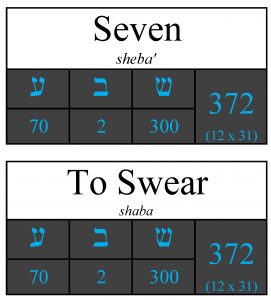 earing of Seven
earing of Seven
The context is important here and requires a better understanding of the Hebrew root word shaba/sware (שבע). This word is the identical phonetic twin of the word sheba/seven (שבע). In other words, before vowel pointings were added to the Hebrew version of the Biblical text, the Hebrew spelling of both words was the same. From this duel meaning root word we get the Hebrew cognates, השבעה shabuw’ah (oath), שבעים shib’iym (seventy), שבעים shabuwa’ (Sevens). So, in other words, in Hebrew, the idea of swaring and its resulting oath is etymologically, phonetically, numerically, and symbolically related to the number seven and its related numerical derivatives.
This bit of Hebrew semantics allows us to look at the covenant Yahweh made with Abraham in Genesis 22 in a different light. That swearing with Abraham was quite literally an Oath of Sevens. This understanding brings new context to Daniel’s opening words in verse 4 where he calls to remembrance the “covenant and mercy” – that oath of Sevens Yahweh sware with Abraham.
Think about Yahweh’s answer to Daniel. The answer given to Daniel was the prophecy of Shabuwa’ Shib’iym (70 Sevens), a prophecy that was, as we have learned, the etymologic, numeric, and dare I say spiritual offspring of that ancient Oath of Sevens.
Returning to the word shaba as used in Deuteronomy, consider its numerical value. The value of this form of the word is 422. Remember this form of the word is used 22 times in Deuteronomy and 22 times in the rest of the OT. Regarding this word, it is fascinating to note that the Hebrew words for 70 & Seven (Shabuwa’ and Shib’iym) as found in Daniel 9:2, 24, and 25, not only share the same etymological roots as sheba’/shaba’ (seven/swear), but they also have the same numerical value.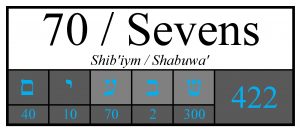 For those who might not be aware, in Daniel 9:24 the prophecy begins with the words שבעים שבעים (seventy sevens). In English, the words have been translated with two different meanings based upon the vowel pointings given by the Masorets. In Hebrew, the words as given are identical. The context was the original determining factor of their meaning. In the text below please keep in mind that Hebrew is read from right to left while the English version from left to right.
For those who might not be aware, in Daniel 9:24 the prophecy begins with the words שבעים שבעים (seventy sevens). In English, the words have been translated with two different meanings based upon the vowel pointings given by the Masorets. In Hebrew, the words as given are identical. The context was the original determining factor of their meaning. In the text below please keep in mind that Hebrew is read from right to left while the English version from left to right.
Daniel 9:24
שבעים שבעים נחתך על עמך ועל עירקדש לכלא
Daniel 9:24
Seventy weeks are determined upon thy people and upon thy holy city,…
With this contextual and numerical understanding of Daniel 9 and its origins in Deuteronomy and Genesis 22 in mind, I’d like to now attempt to explain to you the numerical and compositional genius of Daniel 9 and how Daniel used his divinely inspired skills to present his Jewish brethren with a literary, numerical, symbolic, and prophetic work of art that is unparalleled in recorded history.
Reconstructing Daniel 9
To give you a true sense of the compositional genius of Daniel 9 we need to start at the chronological beginning. When I say chronological beginning, I mean we need to determine the compositional order of the chapter. Thankfully Daniel provides us with that chronological fixing point. Take a look:
Daniel 9:21-23
21 Yea, whiles I was speaking in prayer, even the man Gabriel, whom I had seen in the vision at the beginning, being caused to fly swiftly, touched me about the time of the evening oblation. 22 And he informed me, and talked with me, and said, O Daniel, I am now come forth to give thee skill and understanding. 23 At the beginning of thy supplications the commandment came forth, and I am come to shew thee; for thou art greatly beloved: therefore understand the matter, and consider the vision.
What is helpful about this passage, if taken at face value, is that Daniel received the prophecy of 70 Sevens before he had written down a single word of what we know today as chapter 9. He was still in prayer when the prophecy was given to him. This takes on significant meaning when you realize that Daniel 9:23-27 is a distinct literary unit of 100 words and 418 letters. This is important because this passage of 100 Hebrew words is arranged around the two Hebrew words שבעה ושבעים pronounced sheba’ shabuwa’ (‘7 Sevens’ when read in Hebrew from right to left).
There are 49 words before words שבעה ושבעים and 49 words after, i.e. 49+2+49. Considering the thematic content of Daniel 9:23-27 it takes little imagination to see the intentional nature of such an arrangement.
Further evidence that this passage was an intentional numerical construction is found in the letter count of these 5 verses. There are 204 letters before the 2 words & 10 letters of שבעה ושבעים (7 sevens) and 204 letters after. It is beyond any reasonable doubt that this passage could have been coincidently arranged in this manner. This is further demonstrated when a close examination of the prophecy itself, its solution, the arrangement of the words, verse numbers, and word values are taken into consideration.
Literary and Numerical Construction Techniques of the Hebrew Bible
It has long been known that the authors of the Hebrew Bible constructed many of its passages using chiastic, acrostic, and other literary techniques to emphasize and embellish the text. Only recently though, have scholars been rediscovering that the Hebrew authors arranged certain words, passages, or ideas in a numerically structured manner so that those words, ideas, or themes of the text could be emphasized. Based upon the scribal notes of the Leningrad Codex, the oldest known complete Hebrew text of the Old Testament, the numerical structure of chapters, passages, and words in the Hebrew Bible is testified to as far back as the 1st millennium.
The late professor Casper Labuschange, a pioneeer of Logotechnical analysis of the Hebrew text, explained the purpose of the ancient scribal efforts to count the verses, words, and letters of the Bible:
“The Masoretes and subsequent copiers of the text of the Hebrew Bible, who were responsible for handing down the text, carefully counted verses, words, and even letters of most biblical books and painstakingly located and registered their arithmetic centres. It is usually held that the purpose of this meticulous counting was to ensure that the text was transmitted correctly. However, in my opinion, it had a more specific purpose: namely to preserve the intricate, delicate numerical structures, which can be done only by recounting what has been counted earlier.”
The First 22 Verses
Clearly, Daniel 9:23-27 demonstrates an intentional numerical construction. This construction emphasized the numerical theme of the passage by centering it upon the Hebrew word שבעה ושבעים (7 sevens). This proves beyond a reasonable doubt that this was not an accidental construction.
Since this portion of the text was received before Daniel’s inspired pen composed the rest of the text of Daniel 9, that leads us to consider the possibility that the first 22 verses of Daniel 9 were also a numerical construction used as a literary device to bring special attention to the text.
 A preliminary analysis of the text supports this consideration. Daniel 9 (in Hebrew), taken as a whole, is a passage of 462 words. Its verse structure is centered around 18 words of verse 15. There are 222 words before the 18 word numerical center of verse 15 and 222 words after (222 + 18 + 222). This indicates that Daniel purposely composed the first 22 verses of Daniel 9:1-22 so that when the prophecy of 70 Sevens was included in verses 23-27 its verse structure would be evenly balanced around the 18 words of verse 15. This provides compelling evidence that Daniel 9 was a single and cohesive work.
A preliminary analysis of the text supports this consideration. Daniel 9 (in Hebrew), taken as a whole, is a passage of 462 words. Its verse structure is centered around 18 words of verse 15. There are 222 words before the 18 word numerical center of verse 15 and 222 words after (222 + 18 + 222). This indicates that Daniel purposely composed the first 22 verses of Daniel 9:1-22 so that when the prophecy of 70 Sevens was included in verses 23-27 its verse structure would be evenly balanced around the 18 words of verse 15. This provides compelling evidence that Daniel 9 was a single and cohesive work.
Daniel 9:15
15 And now, O Lord our God, that hast brought thy people forth out of the land of Egypt with a mighty hand, and hast gotten thee renown, as at this day; we have sinned, we have done wickedly.
We already know that Daniel’s opening words in verse 4 are words quoted from Deuteronomy 7 and refer to the Oath of Sevens Yahweh sware with Abraham in Genesis 22. Remember that unilateral swearing by Yahweh with Abarham was, according to numerous references in the book of Deuteronomy, the legal basis for Israel’s claim to the Promised Land. Further a return to the Promised Land, at what Daniel understood to be the end of the prophecied 70 years desolations of Jerusalem (Dan. 9:1-2), was an important underlying theme of Daniel’s prayers and supplications made in the first 22 verses of Daniel 9.
Consider this. In Genesis 22:15 Yahweh swears (shaba) a Oath of Sevens with Abraham. This the text further describes as an irrevocable “blessing” that included (in part) a promise that through Abraham’s “seed” all nations of the earth would be blessed.
The word “bless” in Hebrew is barak. In some cases, this Hebrew word is also translated kneel (bow a knee), and may originate in the sense of kneeling to receive a blessing.
The first occurrence of the root form of barak (bless) is found in Genesis 22:17. This occurrence is right at the heart of the promised blessings made in Yahweh’s Oath of Sevens with Abraham. Blessings that not only included a permanent land grand to the Promised Land, but more importantly those blessings include a promise that through Abraham’s “seed” all nations of the earth would be blessed. Intriguingly, the root form of the word barak (bless) first used in Genesis 22:17 has a numerical value of 222.
So what do you think? Did Daniel just get lucky with a numerical verse structure of 222 + 18 + 222 for chapter 9? Or did Daniel purposely design the first 22 verses of chapter 9 so that when the prophecy of 70 Sevens was included it would highlight the promised blessings of Genesis 22 which he had in mind when he opened his pleadings to Yahweh in Daniel 9:4?
Genesis 22:15-17
5 And the angel of YHWH called unto Abraham out of heaven the second time, 16 And said, By myself have I sworn [shaba], saith YHWH, for because thou hast done this thing, and hast not withheld thy son, thine only son:
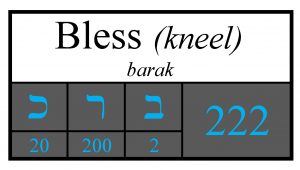 17 That in blessing [barak] I will bless [barak = 222] thee, and in multiplying I will multiply thy seed as the stars of the heaven, and as the sand which is upon the sea shore; and thy seed shall possess the gate of his enemies;
17 That in blessing [barak] I will bless [barak = 222] thee, and in multiplying I will multiply thy seed as the stars of the heaven, and as the sand which is upon the sea shore; and thy seed shall possess the gate of his enemies;
18And in thy seed shall all the nations of the earth be blessed [barak]; because thou hast obeyed my voice.
222 / dabar: Before & After
It might also interest you to note, that the Hebrew word value of 222 is found three times in Daniel 9. The first occurrence is found in Daniel 9:12 which is the first half of the 222 words structure (222 + 18 + 222). Here the word is translate “his words” and comes from the Hebrew root word dabar (דבר) which means word, speech, speak, utterance, matter, thing. In Daniel 9:12 the root dabar (דבר) preceeds its suffix (דבריו).
KJV Daniel 9:12 And he hath confirmed his words [דבריו], which he spake [דבר] against us, and against our judges that judged us, by bringing upon us a great evil: for under the whole heaven hath not been done as hath been done upon Jerusalem.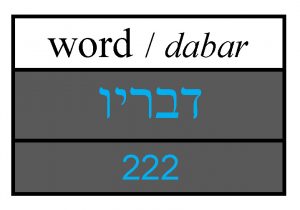
The third occurrence of 222 in Daniel 9 comes 10 verses later in verse 22. Verse 22 falls in the 2nd half of the 222 word structure of Daniel 9 (222 + 18 + 222). Here the word dabar is translated as talked or spoke. This time the root dabar is preceed by (וי) (וידבר). Another way to look at this is that in the first half of Daniel 9 dabar precedes its suffix. In the last half of Daniel 9, dabar follows its prefix.
((דבריו) 222 + 18 + 222 )(וידבר)).
See the chart on the above left for a more visual explanation.
Daniel 9:22
And he informed me, and talked [וידבר] with me, and said, O Daniel, I am now come forth to give thee skill and understanding.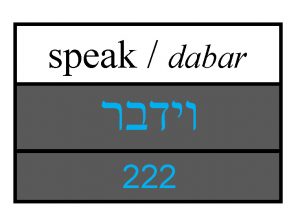
The 2nd occurrence of the 222 word value is found in Daniel 9:13. Here a form of the Hebrew word avon (iniquities) is used. For what is it worth, the only other occurrence of this form of avon is found in Ezra 9:13.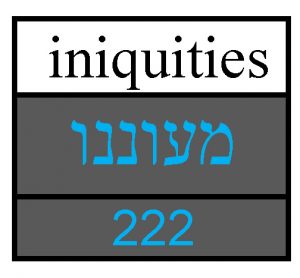
Jacob and 222
I’ve mentioned in past articles that 13 & 14 are often used in the Old and New Testament to represent Yahweh’s redemptive plan through Yeshua (Jesus) the promised “seed”. I believe I’ve also mentioned that the Hebrew word Jacob has a numerical value of 182 or 13×14 and as such, his name appears to have messianic symbolism.
With this in mind, it is worth noting what many consider a messianic prophecy in Numbers 24. Here Baalam prophecies that a star shall come “out of Jacob” and a scepter rise out of Israel. In this passage the 13th Hebrew letter mem precedes the name Jacob. This additional letter gives his name a numerical value of 222.
Numbers 24:17-19
17 I shall see him, but not now: I shall behold him, but not nigh: there shall come a Star out of Jacob [מיעקב = 222], and a Sceptre shall rise out of Israel, and shall smite the corners of Moab, and destroy all the children of Sheth. 18 And Edom shall be a possession, Seir also shall be a possession for his enemies; and Israel shall do valiantly. 19 Out of Jacob [מיעקב = 222] shall come he that shall have dominion, and shall destroy him that remaineth of the city.
Isaiah 65:9
9 And I will bring forth a seed out of Jacob [מיעקב = 222], and out of Judah an inheritor of my mountains: and mine elect shall inherit it, and my servants shall dwell there.
Genesis 28:13-16
13 And, behold, YHWH stood above it, and said, I am YHWH God of Abraham thy father, and the God of Isaac: the land whereon thou liest, to thee will I give it, and to thy seed; 14 And thy seed shall be as the dust of the earth, and thou shalt spread abroad to the west, and to the east, and to the north, and to the south: and in thee and in thy seed shall all the families of the earth be blessed.
15 And, behold, I am with thee, and will keep thee in all places whither thou goest, and will bring thee again into this land; for I will not leave thee, until I have done that which I have spoken to thee of. 16 And Jacob awaked out of his sleep, and he said, Surely YHWH is in this place; and I knew it not.
The Mighty Hand of Yahweh
For the Biblical sleuths out there, can you tell me where the words “mighty hand” (ביד חזקה) are first used in the Bible to describe Yahweh’s deliverance of Israel from Egypt? How about the last occurrence of this phrase?
If you said Exodus 13, you are correct. Moses, when instructing Israel to keep the feast of Unleavened Bread, told them that when their sons asks why they keep the feasts they were to tell them this feast was related to Yahweh’s “mighty hand” that delivered them from Egyptian bondage.
Exodus 13:8-11
8 And thou shalt shew thy son in that day, saying, This is done because of that which YHWH did unto me when I came forth out of Egypt. 9 And it shall be for a sign unto thee upon thine hand, and for a memorial between thine eyes, that YHWH’S law may be in thy mouth: for with a strong hand [ביד חזקה] hath YHWH brought thee out of Egypt.
10 Thou shalt therefore keep this ordinance in his season from year to year. 11 And it shall be when YHWH shall bring thee into the land of the Canaanites, as he sware [נשבע=shaba] unto thee and to thy fathers, and shall give it thee,…
Before continuing with this theme of the “mighty hand” of Yahweh, its worth noting here that Exodus 13:10 connects Israel’s return to the Promised Land with an oath the Yahweh “sware unto thee and to thy fathers”. Once you’ve noticed the significance of Yahweh’s swearing (shaba) with the fathers (beginning with Abraham) you’ll begin to see it mentioned throughout the OT.
Let’s drill down on the Hebrew phrase ביד חזקה (mighty hand) of Yahweh. Anyone care to guess which book of the Bible most often uses this phrase to describe the Exodus events? If you answered, The Book of Words or Deuteronomy, then you are correct. In fact, this phrase is used five times to describe Yahweh’s deliverance of Israel from Egypt. Here take a look:
In the following passage, the“mighty hand” of Yahweh is used in connection with the fourth commandment.
Deuteronomy 5:15
And remember that thou wast a servant in the land of Egypt, and that YHWH thy God brought thee out thence through a mighty hand [ביד חזקה] and by a stretched out arm: therefore YHWH thy God commanded thee to keep the sabbath day.
Here it is used in connection with reminding your son about the Exodus.
Deuteronomy 6:21
Then thou shalt say unto thy son, We were Pharaoh’s bondmen in Egypt; and YHWH brought us out of Egypt with a mighty hand [ביד חזקה] :
Here it is used in connection with Israel’s cries of affliction and Yahweh’s answer to their prayers.
Deuteronomy 26:7-8
7 And when we cried unto YHWH God of our fathers, YHWH heard our voice, and looked on our affliction, and our labour, and our oppression: 8 And YHWH brought us forth out of Egypt with a mighty hand [ביד חזקה] , and with an outstretched arm, and with great terribleness, and with signs, and with wonders:
Here it is in connection with Moses’ pleadings with Yahweh not to destroy Israel and to remember His servants, “Abraham, Isaac, and Jacob”.
Deuteronomy 9:26-29
26 I prayed therefore unto YHWH, and said, O Lord YHWH, destroy not thy people and thine inheritance, which thou hast redeemed through thy greatness, which thou hast brought forth out of Egypt with a mighty hand [ביד חזקה] . 27Remember thy servants, Abraham, Isaac, and Jacob; look not unto the stubbornness of this people, nor to their wickedness, nor to their sin:
28 Lest the land whence thou broughtest us out say, Because YHWH was not able to bring them into the land which he promised them, and because he hated them, he hath brought them out to slay them in the wilderness. 29 Yet they are thy people and thine inheritance, which thou broughtest out by thy mighty power and by thy stretched out arm.
Finally, here the phrase is used in connection with Moses explaining to Israel the real reasons that Yahweh delivered Israel from Egypt. Further, this is the very passage that Daniel refers to in verse 4 of Chapter 9 in his opening plea for Yahweh to restore His people to the Promised Land.
Deuteronomy 7:7-9
7YHWH did not set his love upon you, nor choose you, because ye were more in number than any people; for ye were the fewest of all people: 8 But because YHWH loved you, and because he would keep the oath [shabuw’ah] which he had sworn [shaba’] unto your fathers, hath YHWH brought you out with a mighty hand [ביד חזקה] , and redeemed you out of the house of bondmen, from the hand of Pharaoh king of Egypt.
9 Know therefore that YHWH thy God, he is God, the faithful God, which keepeth covenant and mercy with them that love him and keep his commandments to a thousand generations;
A variation on the “mighty hand” of Yahweh is used an additional 5 times in the book of Deuteronomy.
If you look at every instance of this theme in the book of Deuteronomy you get the sense that the “mighty hand” of Yahweh was employed on behand of Israel when they cried out to Him, when others pleaded on their behalf, when Yahweh was keeping His word or oath to others, and when He worked His sovereign will.
In consideration of how important this theme is to the book of Deuteronomy, the Oath of Sevens, and Israel’s return to the Promised Land, it is rather significant that the final occurrence of the “mighty hand” of Yahweh is found in Daniel 9:15, right in the numerical center of a passage pleading for Israel’s return. These pleadings are followed with a Divine prophetic answer we know as the prophecy of 70 Sevens. Daniel makes the “mighty hand” of Yahweh and the deliverance it provides, the numerical focal point of Chapter 9. Daniel further juxtaposes this deliverance with an unqualified admission of their collective guilt before Him.
Daniel 9:15
And now, O Lord our God, that hast brought thy people forth out of the land of Egypt with a mighty hand [ביד חזקה] , and hast gotten thee renown, as at this day; we have sinned, we have done wickedly.
The Sevens of Daniel 9
Acknowledging the fact that Daniel 9 and the prophecy of 70 Sevens is a prophecy in answer to Daniel’s prayers and supplication concerning the “covenant and mercy” of Yahweh – that ancient Oath of Sevens given by Yahweh to Abraham, it should not come as a surprise that the number 7 might also be an important numerical feature of the 22 verses Daniel composed to highlight this important prophecy. A composition, I might add, that I believe accurately reflected his inspired thoughts, prayers, & supplications up to the point when he received the 70 Sevens prophecy.
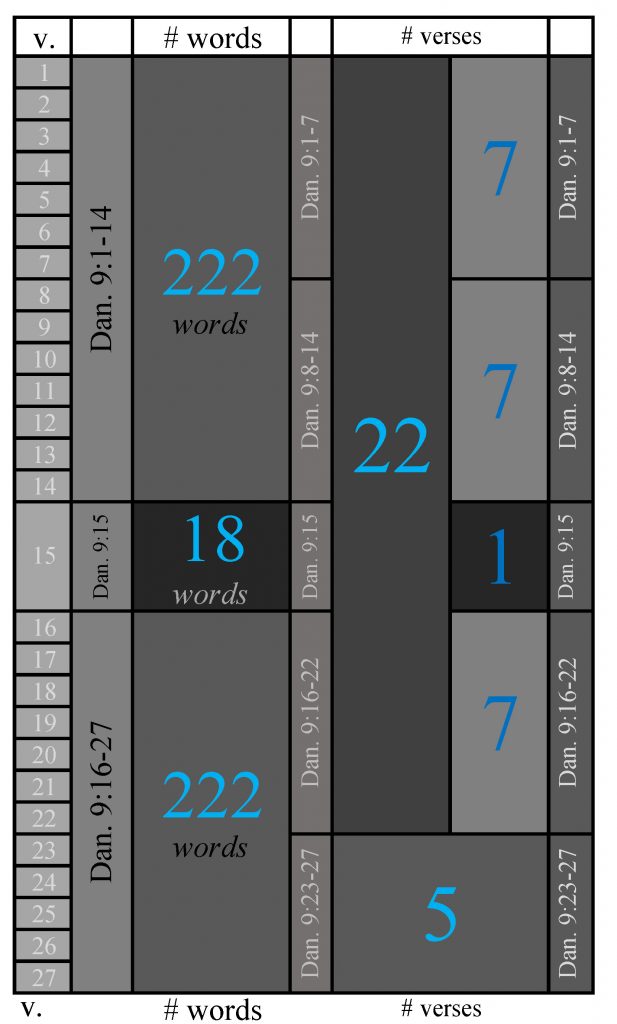 If we take the 100 words of the prophecy of 70 Sevens found in verses 23-27 and the 18 words of verse 15 at the numerical center of Daniel 9, we are then left with just 21 verses in chapter 9. These 21 verses include the 7 verses of Daniel 9:16-22 and the 14 verses of Daniel 9:1-14. Structurally, this means we can ascertain three 7 verse groups remaining in Daniel 9. These 7 verse contain 344 words. (Interestingly 344 is 7x7x7 + 1)
If we take the 100 words of the prophecy of 70 Sevens found in verses 23-27 and the 18 words of verse 15 at the numerical center of Daniel 9, we are then left with just 21 verses in chapter 9. These 21 verses include the 7 verses of Daniel 9:16-22 and the 14 verses of Daniel 9:1-14. Structurally, this means we can ascertain three 7 verse groups remaining in Daniel 9. These 7 verse contain 344 words. (Interestingly 344 is 7x7x7 + 1)
They can be arranged as indicated in the chart on the left. Here is why I believe this also was an intentional arrangement.
The Numerical Value of Yahweh’s Name
A careful exploration of the numerical compositional features of the Hebrew text of the Bible reveals that great emphasis was often put on the numerical value (or a factor of said value) of Yahweh’s proper name. In Hebrew each letter has a numerical value. Using the most common method of calculating the proper name of Yahweh’s gives a value of 26. Because 26 has as its factors 2 & 13, the number 13 (the 6th prime) or multiple of 13 is often used to represent Yahweh’s name in the text. Interestingly, Lord (Adoni) and God (Elohyim), additional titles often used to represent Yahweh in the Hebrew text, also are multiples of 13.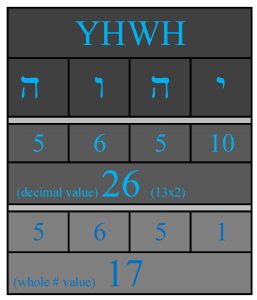
Another, though less widely known, way of calculating the numerical value of Yaweh’s name was to use only whole numbers which gave a value of 17 (the 7th prime number).
Numerically Woven into the Text
The numerical value of Yahweh’s name was showcased in the Hebrew text in several ways. One of the most common was to place the name at strategic locations in the text based upon the word or letter count of the verse. Another way was to arranged the structure of the passage to equal a multiple of the value of the name. In this way Yahweh’s power or presence could be represented in the text bringing additional underlying authority to the text. In some cases, it may have been used simply as an artistic embellishment. In either case, numerically weaving the name of Yahweh into the text was another way to honor the holy name of Yahweh. In the 9th chapter of Daniel both compositional techniques described above are used.
Did you know that in the book of Daniel the proper name of Yahweh is only found in chapter 9? It is used 8 times. Of those 8 occurrences, all of them are found in one of the 7 verse groupings. The first occurrence of Yahweh’s name is the 13th word of verse 2.
Note:(13 is a prime factor of the value of Yahweh’s name which is equal to 26 or 13×2)
The last occurrence of Yahweh’s proper name is the 13th word of verse 20. The 4th occurrence of Yahweh’s name is the 130th word of Daniel 9. The 6th and 7th occurrence are the 206th & 213th words of chapter 9.
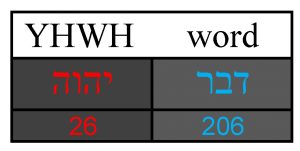 For those interested, the root form of the Hebrew word “dabar” (word) is used 4 times in Daniel 9. It’s numerical value is 206. The first occurrence is found in verse 2 along with the first occurrence of Yahweh’s name. In this verse it references the “word of YHWH” concerning the 70 years spoken of by Jeremiah. Take a look:
For those interested, the root form of the Hebrew word “dabar” (word) is used 4 times in Daniel 9. It’s numerical value is 206. The first occurrence is found in verse 2 along with the first occurrence of Yahweh’s name. In this verse it references the “word of YHWH” concerning the 70 years spoken of by Jeremiah. Take a look:
Daniel 9:2
In the first year of his reign I Daniel understood by books the number of the years, whereof the word of YHWH came to Jeremiah the prophet, that he would accomplish seventy [shabuw’ah = 422] years in the desolations of Jerusalem.
Finally, running through the 13th and 14th verses of chapter 9 is a unique 15-word pattern where Yahweh’s name is used three times separated by 6 words each time for: Yahweh + 6 + Yahweh + 6 + Yahweh. Here Yahweh’s name is every 7th word and there are 13 words between the first and last occurrence of His name in this pattern. In chapter 9 Yahweh is refered to by the titles Lord, and God 24 times. The occurrences are as follows:
- 10 – Lord / Adonay
- 1 – God / El
- 13 – God / Elohiym
- 8 – Yahweh
The Numerical Centers of the Sevens
The numerical genius of the first 22 verses of Daniel 9 shines through in another intriguing way. It has to do with the numerical structure of the 7 verse groupings. By the structure of verses 23-27 (49+2+49) and the overall structure of chapter 9 (222+18+222), it is apparent that Daniel understood the finer points of organizing Hebrew passages into equal halves around a numerical center in order to draw the readers attention to specific themes in the text. Daniel uses this numerical structuring technique when writing the 7 verse groups as well.
The 1st Group of Seven
The first 7 verses of Daniel 9 are 109 words. The meaningful numerical center of this passage is the 13 words that begin Daniel’s prayer and supplications to Yahweh. These are the first words spoken by Daniel in chapter 9. There are 48 words before these 13 words and 48 words after (48 + 13 + 48).
Please forgive me but this bears repeating. The 13 word numerical center of the first 7 verses of Daniel 9, refers by way of Deuteronomy 7, to Yahweh’s Oath of Sevens made with Abraham in Genesis 22. How is that for divinely inspiration numerical genius!
Daniel 9:4
“… and said, O Lord, the great and dreadful God, keeping the covenant and mercy to them that love him, and to them that keep his commandments;”
Deuteronomy 7:7-9, 12
7 YHWH did not set his love upon you, nor choose you, because ye were more in number than any people; for ye were the fewest of all people:
8 But because YHWH loved you, and because he would keep the oath [shabuw’ah]which he had sworn [shaba] unto your fathers, hath YHWH brought you out with a mighty hand, and redeemed you out of the house of bondmen, from the hand of Pharaoh king of Egypt…
9 Know therefore that YHWH thy God, he is God, the faithful God, which keepethcovenant and mercy with them that love him and keep his commandmentsto a thousand generations;
12 Wherefore it shall come to pass, if ye hearken to these judgments, and keep, and do them, that YHWH thy God shall keep unto thee the covenant and the mercy which he sware [shaba] unto thy fathers:
Genesis 22:15-17
15 And the angel of YHWH called unto Abraham out of heaven the second time, 16 And said, By myself have I sworn [shaba], saith YHWH, for because thou hast done this thing, and hast not withheld thy son, thine only son:
17 That in blessing [barak] I will bless [barak= 222] thee, and in multiplying I will multiply thy seed as the stars of the heaven, and as the sand which is upon the sea shore; and thy seed shall possess the gate of his enemies;
18And in thy seed shall all the nations of the earth be blessed [barak]; because thou hast obeyed my voice.
1 Chronicles 16:15-18
15 Be ye mindful always of his covenant; the word [dabar] which he commanded to a thousand generations; 16Even of the covenant which he made with Abraham, and of his oath [shabuwa’] unto Isaac; 17 And hath confirmed the same to Jacob for a law, and to Israel for an everlasting covenant, 18 Saying, Unto thee will I give the land of Canaan, the lot of your inheritance;
The 2nd Group of Seven
The seven verses of Daniel 9:8-14 build upon Daniel’s admission of their collective guilt as a people. There are 113 words in these seven verses. 50 words before the 13 words of its numerical center and 50 after (50 + 13 + 50). The passage climaxes with the acknowledgment that they deserve the curse written by Moses. In the following passage the 13 word numerical center is bracketed in arrows:
Daniel 9:11-13
11 Yea, all Israel have transgressed thy law, even by departing, that they might not obey thy voice; therefore the curse is poured upon us, and the oath that is written in the law of Moses the servant of God,..
>>>because we have sinned against him. 12 And he hath confirmed his words, which he spake against us, and against our judges that judged us, …<<<
by bringing upon us a great evil: for under the whole heaven hath not been done as hath been done upon Jerusalem. 13 As it is written in the law of Moses, all this evil is come upon us: yet made we not our prayer before YHWH our God, that we might turn from our iniquities, and understand thy truth.
To get the fullest sense of what Daniel is saying in the passage above it is helpful to read all seven verses. Once you’ve done that take a look at the following passage where you get a sense that Daniel is again drawing from the words of Moses in Deuteronomy when talking about the curse upon Israel, if they do not obey Yahweh’s laws.
Did you know that Jewish tradition believed that Moses received the law on the 50th day after the exodus? Indeed a case can be made from the Hebrew chronology of the Old Testament that this is the case. Interesting that this group of seven verses highlights the “law of Moses” and its numerical structure of 50 +13 + 50 seems to support this association.
This is especially relevant given Deuteronomy 30:1-5 where it says if Israel returns unto Yahweh (and His laws) He will lift the curse and bring them back to the Promised Land from wherever they are scattered in the world. Again, a return to the Promised Land is an underlying theme of Daniel 9:1-22 and Daniel pleading for this return is best seen within the context of Deuteronomy and the promised blessings of Genesis 22.
Deuteronomy 11:26-28
26 Behold, I set before you this day a blessing and a curse; 27 A blessing, if ye obey the commandments of YHWH your God, which I command you this day: 28 And a curse, if ye will not obey the commandments of YHWH your God, but turn aside out of the way which I command you this day, to go after other gods, which ye have not known.
Deuteronomy 30:1-5
And it shall come to pass, when all these things are come upon thee, the blessing and the curse, which I have set before thee, and thou shalt call them to mind among all the nations, whither YHWH thy God hath driven thee, 2 And shalt return unto YHWH thy God, and shalt obey his voice according to all that I command thee this day, thou and thy children, with all thine heart, and with all thy soul; 3 That then YHWH thy God will turn thy captivity, and have compassion upon thee, and will return and gather thee from all the nations, whither YHWH thy God hath scattered thee.
4 If any of thine be driven out unto the outmost parts of heaven, from thence will YHWH thy God gather thee, and from thence will he fetch thee: 5 And YHWH thy God will bring thee into the land which thy fathers possessed, and thou shalt possess it; and he will do thee good, and multiply thee above thy fathers.
The 3ndGroup of Seven
The final group of seven verses in Daniel 9:16-22 is 122 words and reaches a broken climactic conclusion with the admission of Israel’s collective guilt and a thrice-repeated plea for Yahweh to act. The meaningful numerical center of this passage is 26 words. There are 48 words before this numerical center and 48 after (48 + 26 + 48).
 That Daniel purposely chose this number to highlight the personal name of Yahweh and its value of 26, is indicated by the reference to “thy name” which bookends the 26 word numerical center of this passage. Here is the passage with the numerical center bracketed in arrows. Note that just as the numerical center of the first 7 verses of Daniel 9 began Daniel’s plea to Yahweh, the numerical center of this final group of 7 verses appropriately ends Daniel’s words in Chapter 9. Take a look:
That Daniel purposely chose this number to highlight the personal name of Yahweh and its value of 26, is indicated by the reference to “thy name” which bookends the 26 word numerical center of this passage. Here is the passage with the numerical center bracketed in arrows. Note that just as the numerical center of the first 7 verses of Daniel 9 began Daniel’s plea to Yahweh, the numerical center of this final group of 7 verses appropriately ends Daniel’s words in Chapter 9. Take a look:
Daniel 9:18-19
18 O my God, incline thine ear, and hear; open thine eyes, and behold our desolations, and the city which is called by thy name:
>>>…for we do not present our supplications before thee for our righteousnesses, but for thy great mercies. 19 O Lord, hear; O Lord, forgive; O Lord, hearken and do; defer not, for thine own sake, O my God: for thy city and thy people are called by thy name.<<<
70 Sevens and the Blessing of the Oath of Sevens
How do I summarize something as important and beautiful as the 9th chapter of Daniel? I, frankly, feel inadequate to walk on such holy ground. But if I tried to make this subject as simple as possible I would hope this is not too far from the mark.
Daniel 9 is a prayer by a man of faith, to his faithful Creator. It is a prayer of a contrite sinner to a just and righteous God. It is the prayer, a pleading on behalf of himself and his people for Yahweh to remember an unbreakable oath sworn with their father Abraham. A Oath of Sevens and its blessings, that by way of Deuteronomy and the words of Moses, Daniel painfully explains to his readers why they as a people are totally unworthy to receive.
Nevertheless, by faith in the irrevocable word (dabar) of Yahweh, Daniel pleads for mercy, and for the “mighty hand” of Yahweh to act on their behalf. Just a Yahweh delivered Israel from the hand of Pharaoh, Daniel now pleads for Israel’s deliverance from the 70 years of Babylonian captivity prophesied by Yahweh through Jeremiah.
And once again Yahweh, in response to a man of faith, sets His mighty hand in motion. In answer to Daniel’s prayer regarding the Oath of Seven’s and the related blessings (barak) promised to Abraham, Yahweh sends though the angel Gabriel a prophecy of 70 Sevens. A prophecy that tells when a promised “anointed prince” would “finish the transgression, make an end of sins, to make reconciliation for iniquity, bring in everlasting righteousness, seal up the vision and prophecy, and to anoint the most holy”.
Daniel after receiving this gift of assurance in Israel’s coming redemption and restoration goes on to write this prophecy down in a manner which ensured that his readers would someday understand the significance of these important prophetic words. By framing the entire chapter 9 as 222 + 18 + 222 words including the 100 words verses 23-27, Daniel ensured that his readers would someday understand that the 22 verses that introduce the prophecy of 70 Sevens, were, by way of Deuteronomy 7, an acknowledgment that their return to the Promised Land would only be accomplished by the righteousness of Yahweh in keeping the Oath of Sevens that He sware with Abraham in Genesis 22. An oath that promised in part, that through Abraham’s “seed” all nations of the world would be blessed (barak = 222).
Maybe in the most inadequate and abbreviated way, one might say that Daniel 9 was Daniel’s inspired testimony to his brethern that the promised blessings (barak = 222) of Genesis 22:17-18 would be realized by the “mighty hand” of Yahweh and the redemptive work of His “anointed prince” described in the prophecy of 70 Sevens.
In closing I leave you with the words of Peter, Zacharias (father of John), and the apostle Paul, which confirm that Yeshua of Nazareth was the “anointed prince” of the 70 Sevens – that promised “seed” of Abraham through whom all nations of the earth would be blessed (barak):
Acts 3:25-26
25 Ye are the children of the prophets, and of the covenant which God made with our fathers, saying unto Abraham, And in thy seed shall all the kindreds of the earth be blessed. 26 Unto you first God, having raised up his Son Jesus, sent him to bless [barak = 222] you, in turning away every one of you from his iniquities.
Luke 1:67-75
67 And his father Zacharias was filled with the Holy Ghost, and prophesied, saying, 68 Blessed be the Lord God of Israel; for he hath visited and redeemed his people, 69 And hath raised up an horn of salvation for us in the house of his servant David; 70 As he spake by the mouth of his holy prophets, which have been since the world began: 71 That we should be saved from our enemies, and from the hand of all that hate us; 72 To perform the mercy promised to our fathers, and to remember his holy covenant; 73 The oath [shabuw’ah’] which he sware [shaba’] to our father Abraham, 74 That he would grant unto us, that we being delivered out of the hand of our enemies might serve him without fear, 75 In holiness and righteousness before him, all the days of our life.
Galatians 3:16-19
16 Now to Abraham and his seed were the promises made. He saith not, And to seeds, as of many; but as of one, And to thy seed, which is Christ.17 And this I say, that the covenant, that was confirmed before of God in Christ, the law, which was four hundred and thirty years after, cannot disannul, that it should make the promise of none effect. 18 For if the inheritance be of the law, it is no more of promise: but God gave it to Abraham by promise. 19 Wherefore then serveth the law? It was added because of transgressions, till the seed should come to whom the promise was made; and it was ordained by angels in the hand of a mediator.

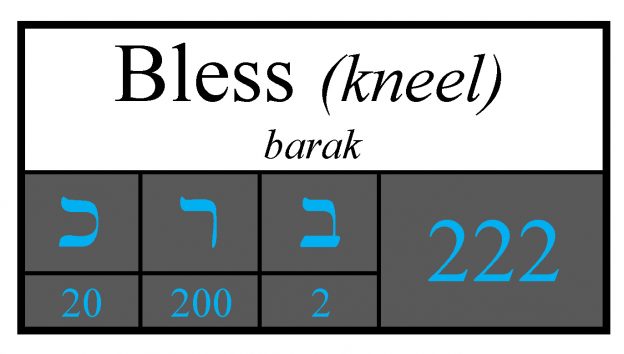

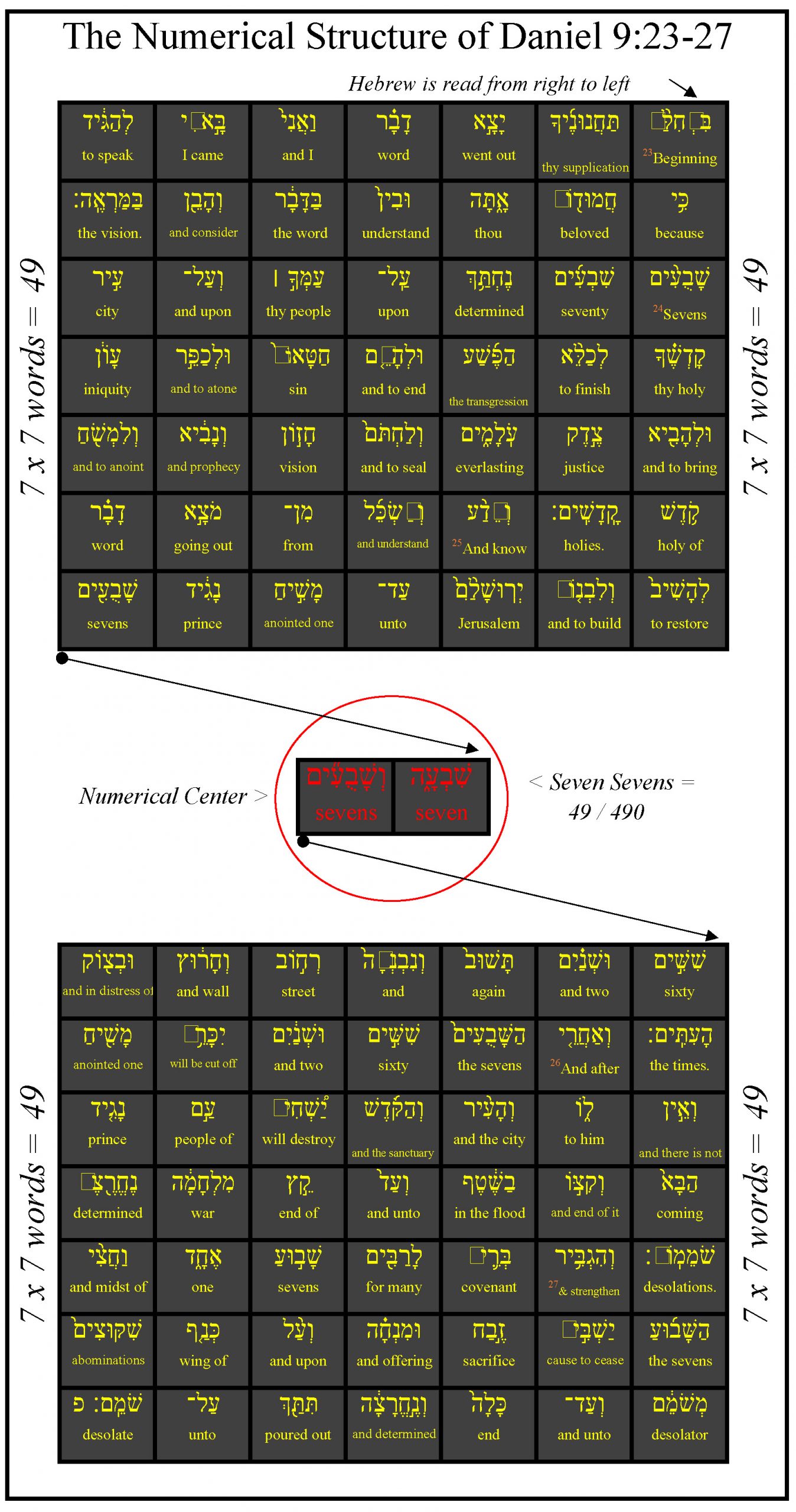
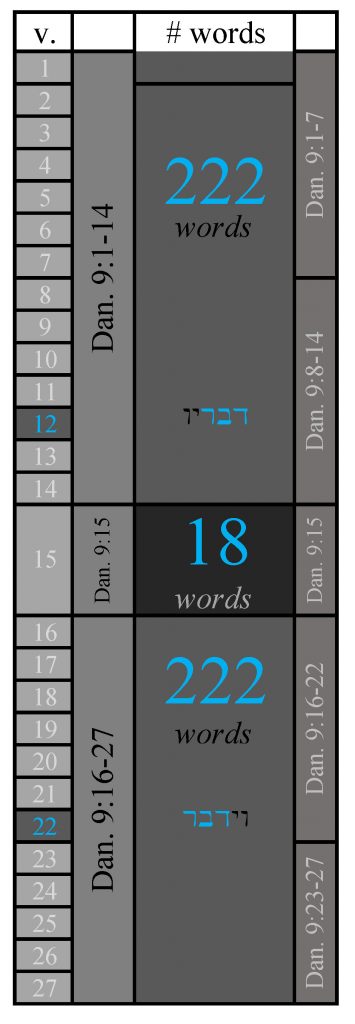
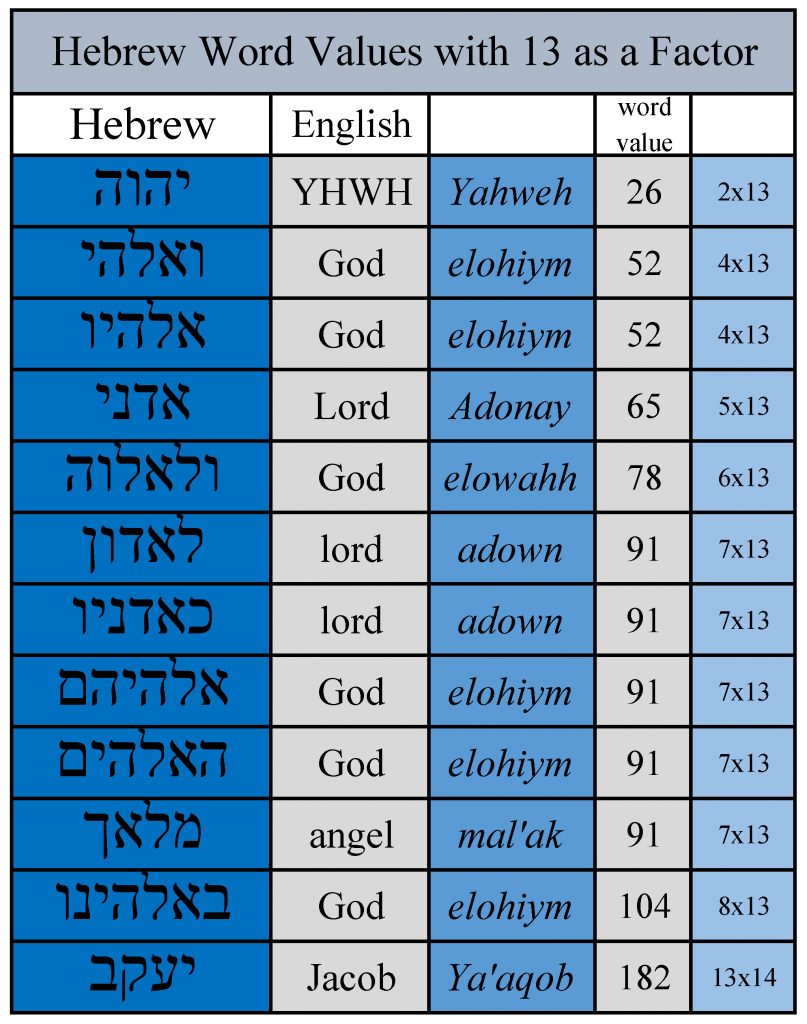
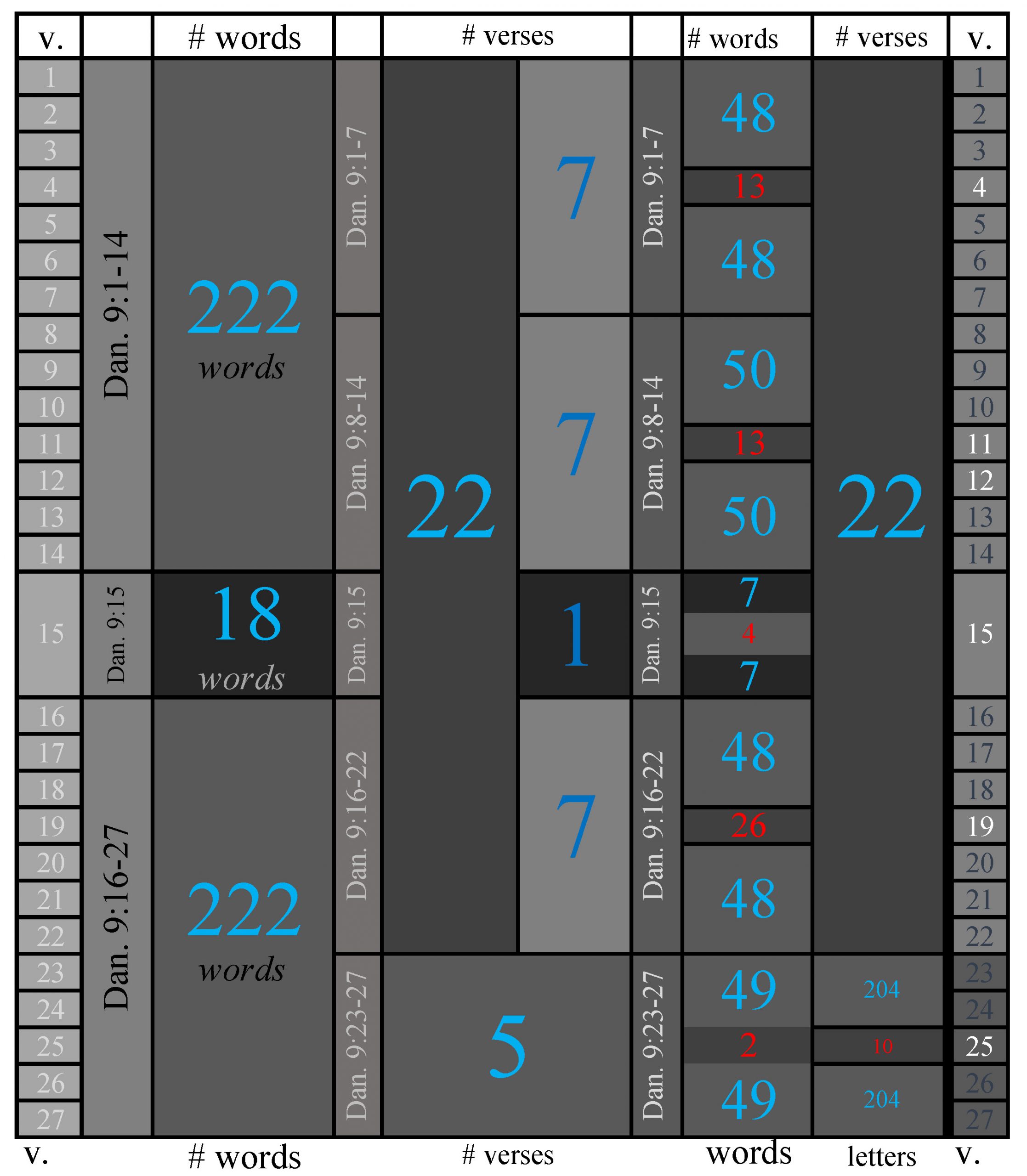
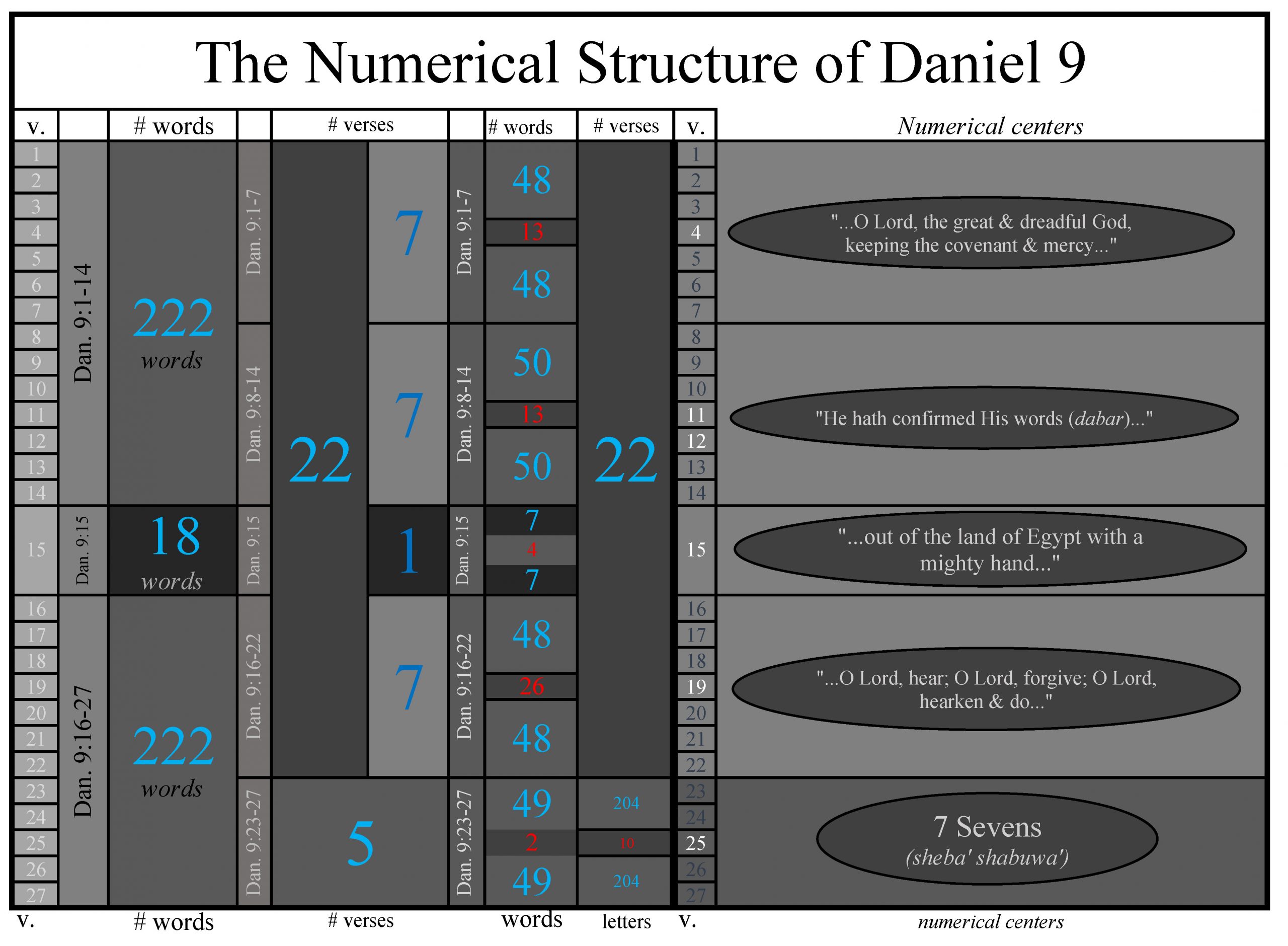
Just brilliant. Thank you for your tireless study and for sharing it.
I’m in awe of Yahweh’s efforts to ensure that we have evidence of His wonderful redemptive plan for mankind. Thank you for the king words Galen.
Warm regards
Another fascinating and well presented look at God’s Word. We miss so much when reading it in English. Thanks, Bill.
Good morning Braxton.
We do indeed miss so much. Isn’t Yahweh’s word an unlimited storehouse of treasure? Appreciate the kind words. My pleasure to share.
Warm regards,
William
Yes Looks very promising. I really want to know more
So please send me your books. I will not
Deflate this mail but wait for your posting books
My email is given
Waiting for your response
I have gone through book of Daniels many times
And want to know more
Please send me
Good morning Charles,
Here is a link to my books that you can download for free.
Book Download
Warm regards,
William
Do we know when the numerical system of letter values was devised?
For example was Genesis 1:1 with its incredible sevens patterns written before the numerical system or did the system already exist?
Would appreciate any feedback on this.
Good morning Leslie,
Not sure about that. I believe that Hebrew did not have a number system separate from the Hebrew script so it would seem they originated at roughly the same time.
Warm regards,
William